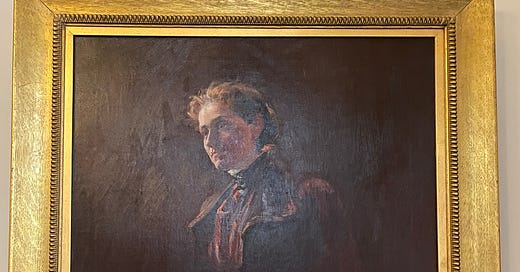The Most Dangerous Woman in America
I’m in Chicago at the moment. My daughter moved here for grad school at DePaul University. When we first arrived, there was nothing in her small, square studio so we sat on the floor, eating food with plastic cutlery while we waited for things to coalesce. To come down off the stresses of the moment, we also made popcorn and watched a few things on her laptop propped up on a box filled with things to unpack. One of these things was this documentary about Jane Addams, one of Chicago’s famous citizens.

Jane Addams
Addams was a truly remarkable woman and her full story and legacy is beyond the scope of this newsletter. What I want to talk about the way she cared. How she was an advocate for equality, education, justice, and peace. How that care made her a target of the FBI. About her legacy.
Her commitment to these values also made her the first woman to win the Nobel Peace Prize. You can see both of these artifacts in her bedroom at the Hull House Museum in Chicago.


I find myself asking why someone who advocated for peace was called “the most dangerous woman in America” by FBI director J. Edgar Hoover. She was opposed to WWI and, as this screenshot of a passage in her FBI file below shows, was in opposition to the “abuse of power by high finance”. Hmmmm….
Is peace really that radical?
It seems so when viewed in opposition to wars that are perceived as “justifiable”. We’re still seeing this pattern of people who oppose war being seen as suspect. What blows my mind about this dynamic is the way that people who are benefiting from the care and activism of others act in opposition to them. Are people so afraid of biting the hand that feeds them, they get in the way of making sure everyone is fed? To what end?
I’ve often encountered working class people defending Capitalism while it slowly kills them and/or criticizing people who have an education or a different type of profession or lifestyle. Many of these people have or are benefiting from the work people are doing but they can’t see it. I wonder what it will take for us to see each other more clearly.
The Overculture
We often hear words like “privilege” and “white culture” thrown around, often in polarizing ways. The women who started this settlement had economic privilege and used it for the benefit of others. Not from an ivory tower but in the house as part of the community they served. They moved into the neighborhood and began to make life more livable, leaving a tremendous legacy. They were of European descent but were actively working against what Dr. Clarissa Pinkola Estes refers to as the “Overculture”. I prefer that term because we can all understand what that means. It’s the culture that wants to keep power and economic structures in place.
In the US, most of us descended from immigrants. Some working class, some not. But the vast majority of citizens have been and are being harmed by the Overculture—by the boot that pushes down on us. We know it when we feel it. We know the fear of displacement and punishment if we “step out of line”. The question is, what keeps us from solidarity with one another? I’m hopefully that shining a light on new or other ways of thinking and being might helpful and inspiring.
Inspiration and Legacy
At the museum, I learned that, among other things, Hull House:
Supported new legislation to advance workers' rights.
Played a significant role in the founding of the nation's first juvenile court.
Conducted sociological studies on neighborhood public health conditions and advocated for housing regulation and reform.
Created public education programs.
Built neighborhood playgrounds.
Advocated for women's and immigrants' rights.
Offered art classes that supported people of all ages and backgrounds and launched the careers of Chicago’s most celebrated artists such as Margaret Burroughs and Charles White.
I find this quote from one of the reformers inspiring:
Life at Hull-House satisfied every longing, for companionship, for the excitement of new experiences, for constant intellectual stimulation and for being caught up in a big movement for social change which enlisted my enthusiastic loyalty.
~Alice Hamilton
To quote Liz Lemon from the show 30 Rock, “I want to go to there”.
Because of their massive impact, I am going to devote the next three Wednesday Deep Dives to exploring Hull House. There’s just so much to share!
I hope you’ll join me.
I would love to hear what you think. Here are two questions to get started:
Why do you think people are threatened by a group of people caring for one another and the world?
What would a world without those dynamics look like?
Thanks for being here.
All my love,
Kymberlee




